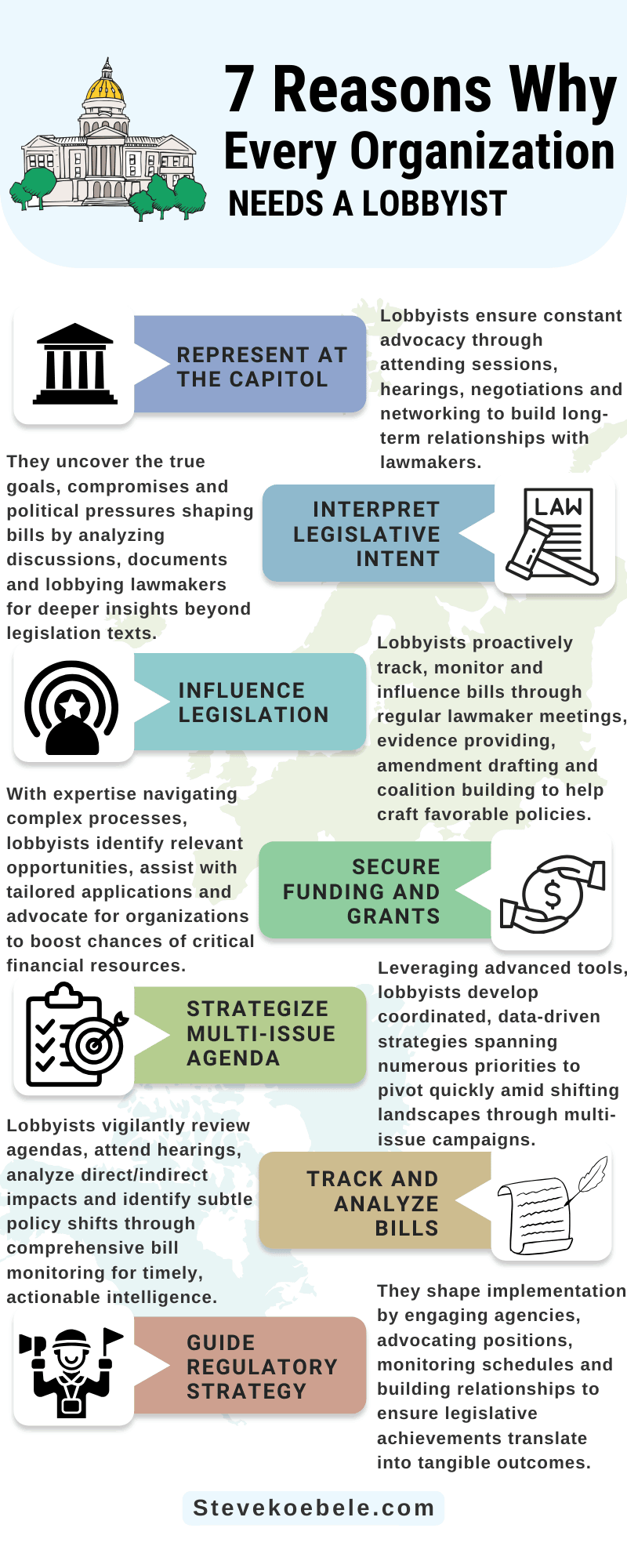
Over $667 million was spent by lobbyist clients on Texas lobbying firms and lobbyists to influence lawmakers during the 2020 election cycle, demonstrating just how integral lobbying has become in the Lone Star State. As policies and regulations continue shaping the business environment, utilizing lobbying services has become essential for any organization with a stake in the legislative process and executive agency activities.

Texas lobbyists typically spend numerous hours at the Texas Capitol. A great lobbyist attends crucial sessions, focuses during lengthy hearings, communicates with lawmakers, and engages in high-stakes negotiations. Lobbyists are “boots on the ground” because you must be present to win. Think of lobbyists as your surrogates during government action.
Here's what lobbyists do at the Texas Capitol:
Lobbyists build relationships over time. They become familiar and trusted faces in the halls of power. This ongoing presence matters. It keeps your organization's interests front and center.
Without a Lobbyist | With a Lobbyist |
Limited Capitol presence | Constant representation |
Miss key discussions | Engages in discussions and keeps you informed |
You can't always drop everything to rush to Austin. Texas lobbying firms ensure you're never left out of important conversations. They're your dedicated advocate when you can't be there yourself.
Bills can be complicated and confusing. The language is often dense and full of legalese. But there's more to legislation than just the words on paper. Successful and experienced lobbyists dig deeper to develop or uncover the true goals and compromises that shape new laws.
How do lobbyists gain these insights?
This insider perspective is invaluable. It helps you understand what a law says, why it exists, and how it might be applied or improved. The best Texas lobbyists translate complex political maneuvering into actionable information for your organization.
Surface-Level Understanding | Lobbyist's Insight |
Read bill text only | Grasp underlying motivations |
Miss nuances and implications | Anticipate real-world effects |
With a qualified Texas lobbyist, you're not just reacting to new laws. You're understanding their origins and potential impacts. This knowledge lets you plan ahead and adapt your strategies accordingly.
Full-time lobbyists keep a watchful eye on the Texas legislature. Focusing on client goals, the best lobbyists arrange bill filings, kill bad bills, and otherwise track bills as they move through the system. These professionals meet with lawmakers regularly. Their goal? To sway opinions and motivate action on proposed laws that could affect your organization.
Here's how lobbyists work to influence legislation:
Lobbyists often spot potential issues early. A successful lobbyist raises alarms before harmful bills gain traction. This proactive approach saves time and resources. It's much easier to shape a bill early than fight it later.
Without Lobbying Efforts | With Active Lobbying |
React to passed laws | Help craft favorable legislation |
Limited input on public policy | Ongoing dialogue with lawmakers |
Your lobbyist becomes a trusted source of information. The best Texas lobbyists will educate lawmakers on complex industry issues. This relationship builds credibility and trust. It ensures your voice is heard when crucial decisions are made.
Remember, laws can make or break businesses. A skilled lobbyist helps tilt the scales in your favor. They're your advocate in the complex world of Texas politics.
Many Texas lobbyists are experts in government funding processes. The best Texas lobbyists know how to navigate the complex world of grants and subsidies. This knowledge can be a game-changer for your organization's financial health.
Ways lobbyists help secure funding:
Government funding isn't just about free money. It's strategic. Lobbyists understand which programs align with your goals. They know how to position your organization effectively.
DIY Approach | Lobbyist-Assisted |
Miss opportunities | Comprehensive funding strategy |
Struggle with bureaucracy | Streamlined application process |
Lobbyists often have insider knowledge of funding priorities. A great Texas lobbyist can help you tailor proposals for success. This expertise significantly boosts your chances of securing critical resources.
Consider the ripple effects of new funding. It can fuel expansion, research, or job creation. A skilled lobbyist doesn't just find money. A qualified Texas lobbyist can open doors to long-term growth and innovation.
Effective advocacy often spans numerous legislative priorities. This complexity demands year-round attention in Austin, including “Interim Study Charges” and the Sunset Commission process. Skilled lobbyists coordinate these efforts seamlessly. The best Texas lobbyists can ensure your organization's voice is heard on all relevant issues.
Modern lobbying firms use advanced tools to craft smarter campaigns:
These tools help lobbyists develop nuanced, data-driven strategies. High quality Texas lobbyists can pivot quickly as the political landscape shifts. This adaptability is crucial in Texas's fast-paced legislative and executive agency environments.
Without Strategic Lobbying | With Strategic Lobbying |
Scattered advocacy efforts | Coordinated, multi-issue approach |
Reactive to changes | Proactive, data-informed strategy |
A strategic lobbyist doesn't just react to events. Using the calendar wisely, a successful lobbyist in Texas will anticipate challenges and discover opportunities. This foresight allows your organization to stay ahead of the curve. It transforms your advocacy from piecemeal efforts into a cohesive, powerful campaign.
Bill-tracking is a crucial lobbyist function. Academically ground Texas lobbyists monitor all pre-filed bills closely and maintain vigilance that extends throughout the legislative session. Lobbyists dissect each bill's potential impact on your organization.
Key aspects of bill tracking and analysis:
Lobbyists warn of unfavorable policy proposals early during the process. They spot language buried in complex bills, and this keen eye prevents unwelcome surprises late in the process.
Self-Monitoring | Lobbyist-Assisted Monitoring |
Miss subtle policy shifts | Comprehensive bill analysis |
Overwhelmed by volume | Focused, relevant updates |
With a qualified Texas lobbyist, you're always informed via timely and actionable intelligence. This knowledge and information empowers your organization to respond swiftly and effectively to legislative developments.
Passing favorable legislation and stopping bad bills are critical first steps. Implementation is equally crucial. Lobbyists guide your organization through this complex process. Focusing on executive agency activities and the administrative rule proposal and adoption process, an experienced Texas lobbyist can help secure desired outcomes during the regulatory phase.
How lobbyists shape implementation:
Top Texas lobbyists, especially those with a juris doctor degree, understand the nuances of administrative law. A top-tier Texas lobbyist knows how to effectively navigate the bureaucratic processes. This expertise helps ensure your Texas legislative victories translate into real-world benefits.
Without Regulatory Guidance | With Lobbyist Support |
Risk unfavorable rule adoptions | Shape favorable rule adoptions |
Miss critical deadlines | Timely engage and win in the process |
A skilled Texas lobbyist doesn't stop when a bill passes. The best Texas lobbyists remain vigilant throughout the regulatory process. This ongoing effort protects and enhances your hard-won legislative achievements.
Yes, lobbying is legal in Texas, but it is a regulated activity requiring careful consideration and compliance with state laws and regulations. As someone looking to hire Texas lobbying firms, consider the elements below.
As an existing or potential lobbying client, you must work closely with an experienced lobbyist to fully comply with all applicable requirements.
When hiring a Texas lobbyist, experience not only matters – experience is critical. Ask about the lobbyist’s history of success. Request specific examples of legislative wins. Inquire about previous regulatory victories for clients. This information and documentation will reveal experience, effectiveness, and proven success in both the legislative and executive branches of Texas government.
Key points to discuss:
A seasoned and successful Texas lobbying expert knows the public policy players and the Texas political landscape. They understand the winning process, tactics, and strategies. This insider knowledge can make or break your lobbying effort toward your goals and objectives.
Red Flags | Green Lights |
Vague answers about past successes | Detailed examples of legislative wins |
Limited Texas-specific experience | Long-standing successful presence in Austin |
Ask for concrete House Bill and Senate Bill number examples. How did they change laws via a specific HB or SB? As a true curve ball, ask the Texas lobbyist to identify a game-changing amendment that the Texas lobbyist successfully attached to a moving piece of legislation. What regulations did they influence? Their answers will show their real-world impact.
Every Texas lobbyist has a unique approach. Some focus on direct lawmaker engagement. Others build broad coalitions. Many use a mix of tactics. Understanding their tactics and strategy will help you choose wisely.
Key areas to explore:
Effective lobbyists adapt to changing political winds. Great Texas lobbyists should explain how they stay informed and align with current lawmakers and executive branch leaders. Ask how they turn information into action.
The individuals working on your account matter enormously. They're your direct link to Texas politics. Get to know them before signing on.
Questions to ask about team members:
Evaluate their communication style. Does the Texas lobbyist have a law degree and thereby the ability to speak the language of law to lawmakers? You'll work closely with these people. Ensure they're a good fit.
Concerning Traits | Desirable Traits |
Limited Texas-specific experience | Deep roots in Austin & Texas politics |
Vague about team assignments | Clear roles and responsibilities |
Look for a blend of experience and expertise. Your Texas lobbyist should have the academic ability to understand your industry deeply. In the Texas political world of art and science, your lobbyist should know Texas inside and out.
Lobbying firms often represent multiple clients, which can create conflicts. Ask how they manage potential issues. Transparency here is crucial.
Key areas to discuss:
Reputable lobbyists have clear conflict management procedures. They should explain these easily. Ask for specific examples of how they've handled past conflicts.
Concerning Practices | Best Practices |
Lack of clear conflict policies | Documented ethical guidelines |
Reluctance to discuss conflicts | Open about potential issues |
Look for firms with robust ethical frameworks. They should prioritize your interests. Clear policies protect you and them.
Client references offer invaluable insights. They reveal the firm's true effectiveness. Ask to speak with current and past clients.
Questions to ask for references:
Pay attention to overall satisfaction levels. Ask about both successes and setbacks. How the firm handles difficulties is telling.
Warning Signs | Positive Indicators |
Reluctance to provide references | Multiple satisfied clients willing to speak |
Vague or lukewarm praise | Specific examples of positive outcomes |
Seek out references in industries across the board. Listen for patterns across multiple references.
As one of Austin's most prominent Texas lobbying firms with ongoing engagement at the Texas Capitol since the 1990s, Steve Koebele and TexCounsel bring unmatched expertise in navigating the legislative process, developed from a deep understanding of state and federal government matters.
Founded by Steve Koebele, with more than 33+ years of experience as an attorney licensed in Texas and Washington D.C., TexCounsel has decades of success representing market leaders, Fortune 500 companies, and associations. Contact Steve Koebele directly to confidentially discuss your important Texas public policy matters and issues.